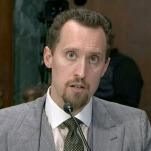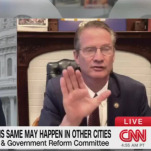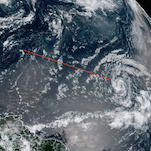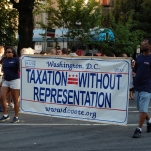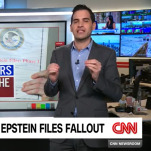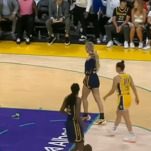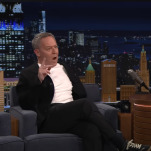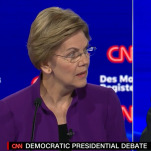How 'Difficult People' challenges the conventions of sex and relationships in modern sitcoms
“What did I ever do to deserve you?” diminutive redhead Julie asks Arthur, her clean-cut, bespectacled, and bow-tied PBS lifer of a live-in boyfriend, after he presents her with a taco (no lettuce, no tomatoes, just unseasoned beef on a tortilla) he prepared in accordance with her unrefined palette. She’s just spent the better part of the weekend waging a war against society’s insistence on shunning adults who’d rather eat chicken fingers than foie gras. Her crusade has included multiple refusals of Arthur’s expertly cooked meals.
“Ah, sometimes I wonder,” he says, lovingly. Julie smiles, not offended.
Were this a typical sitcom from the inception of the genre—think Everybody Loves Raymond, Martin, or literally any half-hour show inserted into NBC’s Must See TV block during the ’90s—the wacky, lovable picky eater would be our male protagonist, and the patient partner his doting and reliable but perpetually annoyed wife or girlfriend. But this is not your typical sitcom, with rote themes and perspectives channeled through the prism of the heterosexual male gaze. It’s Difficult People, which wrapped up an eight-episode first season last September, and returns to Hulu on July 12. It’s also, secretly, one of the most subversive pieces of art in comedy today.
On its face, it looks like a lot of other sitcoms. In fact, the Hulu show’s IMDB plot summary could describe any one of dozens of television programs, past, present, and future: “Life is really tough for Julie and Billy, two 30-something aspiring comics living and working in New York City. While their friends and acquaintances move on to find success and love, they continue to struggle with careers and relationships, getting more bitter by the day.” It appeared that this show would occupy the same space in the zeitgeist as a string of recent comedies glorifying misanthropy, including You’re the Worst and Veep.
Difficult People was created by New York comedian Julie Klausner, who stars alongside Billy Eichner of Billy on the Street. Amy Poehler is attached as executive producer. In the pilot episode, Klausner and Eichner, playing less successful and meaner versions of themselves, rush to attend a matinee of Annie, each separately excoriating tourists along the way. They take their seats and launch into small talk, triggering some exposition so we can figure out who these people are. They begin by talking about the guy Billy is dating, and not just in vague sexual terms. How does Billy feel about his relationship? Julie wants to know.
The first time we meet the male lead of this television show, we learn he’s gay, with real desires, sexual and otherwise, and his friend asks him about them—not to eventually make a joke at his (and homosexuality’s) expense, but because that’s how people actually speak to each other. Over the course of the first season, Billy has multiple relationships, sexual and otherwise, because, you know, he’s a real person and not a caricature of urban homosexuality. In “Pledge Week,” he dumps a really great guy because he’s an audience volunteer at a magic show. (“He’s a participator!” Julie screams when she hears the news.) In “Premium Membership,” he shakes off the boredom of dating a nice guy by jerking off with a stranger (played by guest star Seth Meyers) behind an indoor dog park.
“It’s important for me to portray gay men as truthfully as possible: as sexual, three-dimensional human beings, and not just as people who have friendships with women who want to give them makeovers,” Klausner told me when we spoke on the phone recently. “On top of that, one of goals and prongs of my agenda was to depict a different relationship between a straight girl and a gay guy than what we’ve already seen.”
Klausner and Eichner, perhaps the finest one-two punch on television right now, then verbally exsanguinate a mother who has the audacity to ask them not to curse in front of her children with machine gun-fast one-liners.
“I paid $120. I can say ‘shit’ if I want to. You’re not even seeing the real Annie today,” Billy pointedly whispers in the son’s ear. “Do you know what an understudy is?” Julie asks the daughter, blowing a raspberry in her face.
-

-

-

-

-

-

-

-

-

-

-

-

-

-

-

-

-

-

-

-

-

-

-

-

-

-

-

-

-

-

-

-

-

-

-

-

-

-

-

-

-

-

-

-

-

-

-

-

-

-

-

-

-

-

-

-

-

-

-

-

-

-

-

-

-

-

-

-

-

-

-

-

-

-

-

-

-

-

-

-

-

-

-

-

-

-

-

-

-

-

-

-

-

-

-

-

-

-

-

-

-

-

-

-

-

-

-

-






























































































